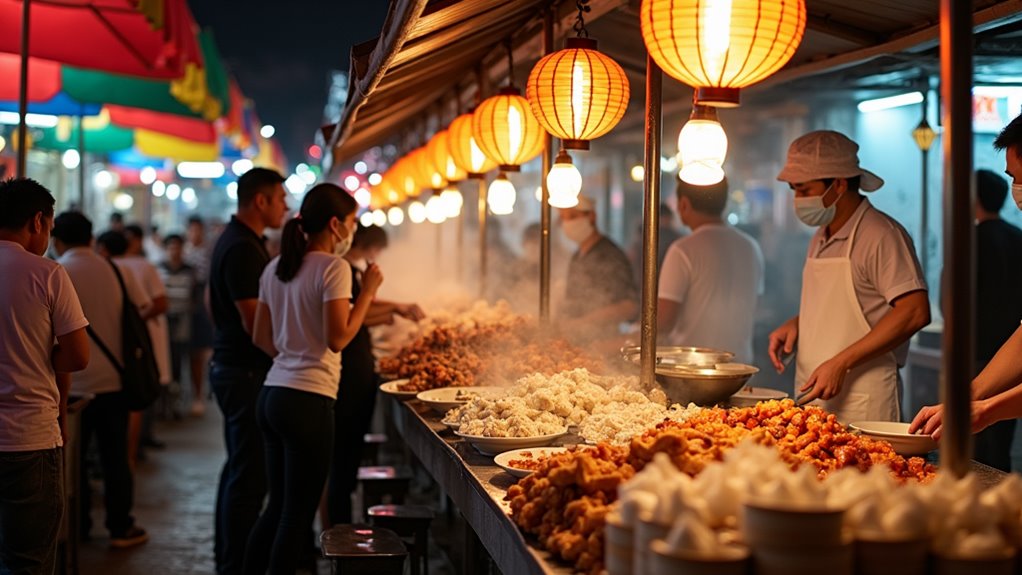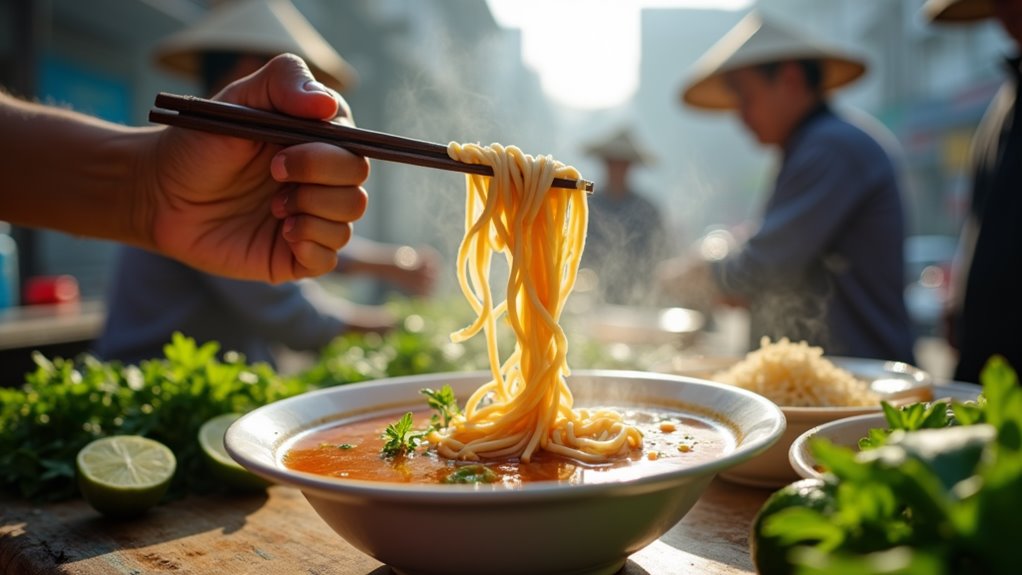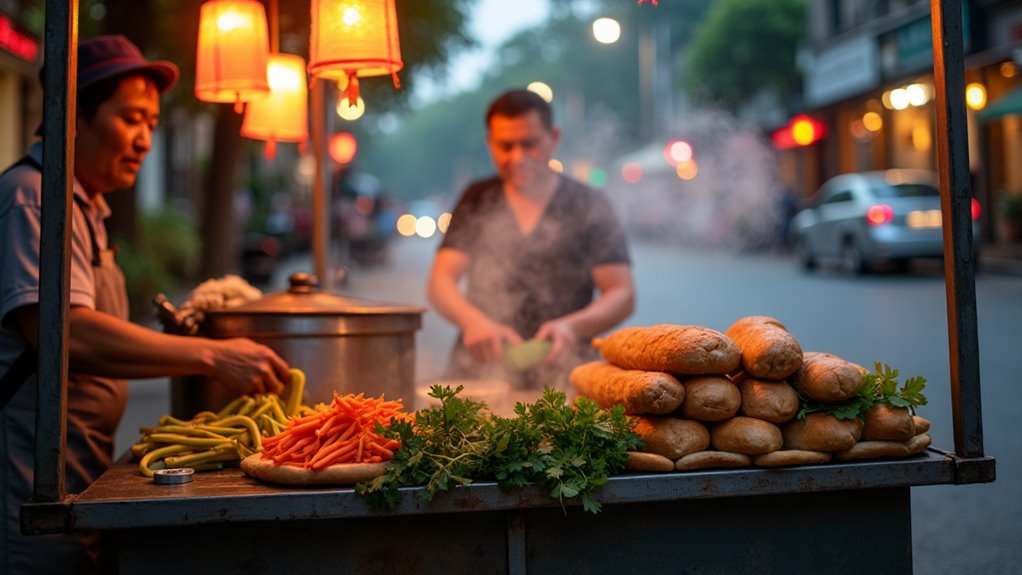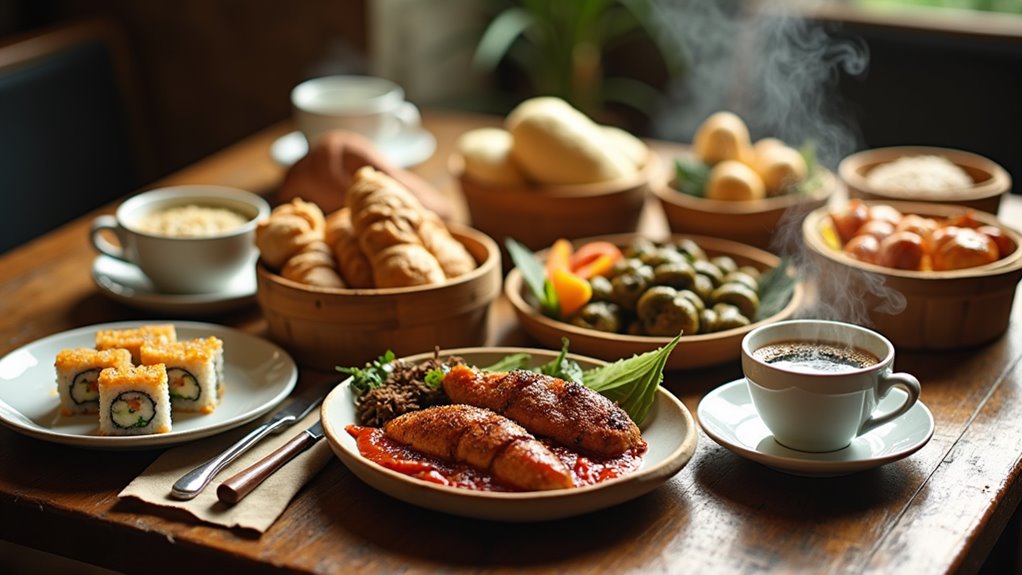Your culinary journey can span vibrant food markets like Barcelona's La Boqueria and Tokyo's Tsukiji, where you'll discover fresh local ingredients and traditional specialties. Don't miss world-renowned restaurants such as Copenhagen's Noma for innovative Nordic cuisine or Peru's Central for altitude-based gastronomy. You'll want to join authentic food tours for market walks and street food sampling, then enhance your skills with immersive cooking classes in destinations like San Sebastian and Hoi An. From Bangkok's sizzling night markets to Istanbul's spice-filled bazaars, each destination offers unique flavors and cultural insights that'll inspire your next food adventure.
Key Takeaways
- Visit historic food markets like Barcelona's La Boqueria or Tokyo's Tsukiji for authentic local ingredients and traditional dishes.
- Take guided food tours that combine market walks, street food sampling, and cultural insights from knowledgeable local experts.
- Experience world-renowned restaurants such as Noma and Central to understand innovative interpretations of regional cuisines.
- Participate in cooking classes at prestigious schools like Le Cordon Bleu to learn traditional techniques and recipes.
- Explore vibrant street food scenes in Bangkok, Mexico City, and Penang for authentic local flavors.
Essential Food Markets Around the Globe

Where better to experience a city's culinary soul than its vibrant food markets? From Barcelona's La Boqueria to Tokyo's Tsukiji Outer Market, these bustling hubs showcase local ingredients, traditional dishes, and authentic flavors that define regional cuisine.
You'll find Bangkok's Or Tor Kor Market filled with tropical fruits, fresh seafood, and ready-to-eat Thai specialties. In Istanbul's Spice Bazaar, you're surrounded by aromatic spices, Turkish delight, and local cheese varieties.
London's Borough Market offers artisanal products, from Neal's Yard cheeses to freshly baked sourdough bread. Meanwhile, Mexico City's La Merced immerses you in a maze of vendors selling everything from mole paste to chapulines.
These markets aren't just shopping destinations – they're living museums of culinary heritage where you can taste, learn, and connect with local food culture.
Must-Visit Restaurant Destinations
Beyond the bustling markets, the world's greatest restaurants offer unforgettable culinary experiences that define modern gastronomy.
You'll find Noma in Copenhagen pushing boundaries with Nordic foraging, while Osteria Francescana in Modena reimagines Italian classics through an artistic lens.
For Asian excellence, Tokyo's Sukiyabashi Jiro serves legendary sushi in its intimate subway location, while Bangkok's Gaggan elevates Indian cuisine to molecular heights.
In Peru, Central celebrates altitude-based biodiversity through innovative dishes that showcase ingredients from varying elevations.
Don't miss Spain's El Celler de Can Roca, where three brothers combine traditional Catalan flavors with cutting-edge techniques.
These destinations aren't just restaurants; they're culinary theaters where you'll experience food as art, science, and cultural expression.
Local Food Tour Experiences

While Michelin-starred restaurants offer refined experiences, local food tours provide an authentic taste of a destination's culinary soul.
You'll weave through bustling markets, sample street food delicacies, and discover hidden gems that locals cherish. Expert guides share stories behind traditional dishes and explain the cultural significance of ingredients and cooking methods.
Join a tapas crawl in Barcelona's Gothic Quarter, explore Tokyo's Tsukiji fish market at dawn, or taste your way through Istanbul's spice bazaar.
These tours often include hands-on experiences like cooking demonstrations, market shopping tutorials, and wine pairings. You'll learn about regional specialties, seasonal ingredients, and time-honored preparation techniques that have shaped local cuisines.
Most tours accommodate dietary restrictions and offer intimate group sizes to ensure personalized attention.
Cooking Classes Worth Traveling For
What better way to master a cuisine than by learning from those who know it best? Whether you're rolling pasta in Tuscany or perfecting pad thai in Bangkok, hands-on cooking classes offer authentic culinary insights you won't find elsewhere.
You'll discover traditional techniques at Spain's San Sebastian Cooking School, where you'll learn the art of Basque pintxos.
In Hoi An, Vietnam, the Red Bridge Cooking School combines market tours with lessons in crafting perfect spring rolls.
For French cuisine enthusiasts, Le Cordon Bleu Paris offers short courses where you'll master classic sauces and pastries.
Don't overlook unique experiences like making soba noodles in Kyoto or crafting chocolate in Ecuador's cacao region. These classes not only teach you valuable skills but also connect you with local food culture in meaningful ways.
Street Food Culture Hotspots

As travelers seek authentic local experiences, street food markets have become essential destinations for culinary adventurers.
You'll find some of the world's most vibrant street food scenes in Bangkok's bustling night markets, where sizzling pad thai and spicy som tam tempt passersby.
In Mexico City's historic center, you can't miss the array of tacos al pastor and elotes vendors who've perfected their craft over generations.
Penang's hawker stalls offer Malaysia's finest street cuisine, from char kway teow to laksa, while Istanbul's Grand Bazaar lets you sample kebabs and pide amid centuries of history.
For modern street food innovation, head to Portland's famous food cart pods or Taiwan's Shilin Night Market, where traditional meets contemporary in delicious harmony.
Each destination offers a unique window into local culture through its street cuisine.
Frequently Asked Questions
What Should I Do if I Have Food Allergies While Traveling Abroad?
Research and document your allergies in the local language, and carry translation cards that clearly explain your restrictions.
You'll want to inform restaurants before ordering and pack emergency medication, including antihistamines and an EpiPen if prescribed.
Always wear a medical alert bracelet and learn how to communicate your allergies in basic phrases.
It's smart to research local hospitals and keep emergency numbers handy.
How Can I Avoid Getting Sick From Trying Unfamiliar Foods Overseas?
Start with familiar ingredients and gradually explore new foods.
Stick to well-cooked, hot dishes and avoid raw or uncooked items in areas with questionable food safety.
You'll want to drink bottled water and skip ice in risky regions.
Eat at busy restaurants where food turnover is high, and don't forget to pack basic medicines like antacids.
Trust your instincts – if something doesn't look right, don't eat it.
Which Travel Insurance Plans Best Cover Food-Related Emergencies and Medical Evacuations?
Look for plans that specifically include coverage for food poisoning and gastric issues.
World Nomads and Allianz Premium plans offer robust coverage for food-related illnesses.
You'll want at least $100,000 in medical coverage and $500,000 for emergency evacuation.
Don't skip reading the fine print about pre-existing conditions and make sure your plan covers the regions you're visiting.
Should I Tip Food Vendors and Cooking Instructors Differently in Various Countries?
Like navigating a cultural maze, tipping practices vary significantly around the globe.
You'll want to research local customs before your trip, as tipping food vendors in Thailand might offend them, while it's expected in the US.
For cooking instructors, you should generally tip 10-20% in Western countries, but in many Asian countries, a small gift or sincere thank-you note is more appropriate than cash.
What Photography Etiquette Should I Follow When Documenting Food Experiences Abroad?
Always ask vendors or restaurants for permission before taking photos.
You'll want to respect any "no photography" policies and be mindful of other diners.
Don't use flash, as it's disruptive and ruins food presentation.
When photographing street vendors or local markets, offer to purchase something first.
Keep your photo sessions brief, and avoid blocking pathways or holding up service for others.
Conclusion
Your culinary passport is just waiting to be stamped with a world of flavors, like jewels in a treasure chest waiting to be discovered. Whether you're diving into Bangkok's street food scene, mastering pasta-making in Bologna, or haggling at Istanbul's Spice Bazaar, these food-focused adventures will transform you from tourist to true gastronome. Let your taste buds guide you through the ultimate foodie's journey around the globe.

Leave a Reply